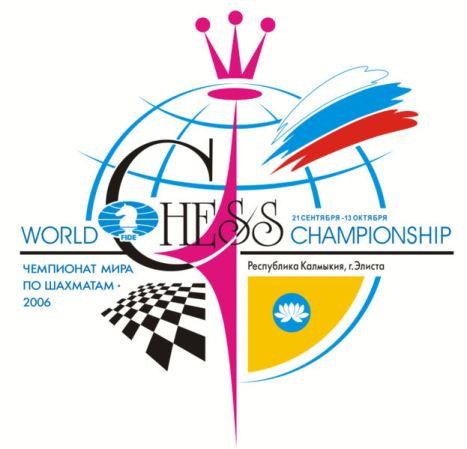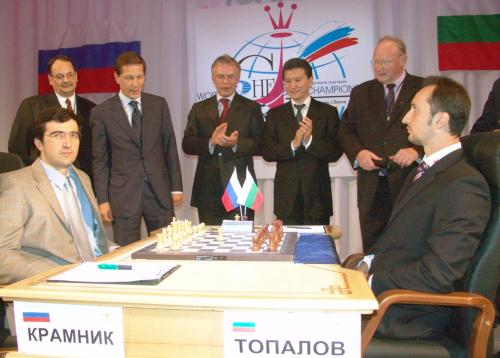
Topalov vs Kramnik | 2006 World Chess Championship
So far, I have only been covering the world championship matches where the title actually changed hands.
However, since this series has turned into not just a look at the instructive and beautiful endgames played at the highest level of chess, but also an historical account of the world championship, I have decided to cover the 2006 match between Vladimir Kramnik and Veselin Topalov, which reunified the world championship title.
As you know if you read my last article, in 1993 Garry Kasparov and Nigel Short decided to play their world championship match outside of the auspices of FIDE. This created a rift in the chess world, where Kasparov retained the legitimacy in the eyes of the public as the champion, undefeated in match play, but where FIDE held its own competing world championship events.
Between 1993 and 2006, Anatoly Karpov, Alexander Khalifman, Viswanathan Anand, Ruslan Ponomariov, Rustam Kasimdzhanov, and Topalov won the title of FIDE "world champion."
Having not defeated Kasparov or Kramnik in match play, however, the public -- and probably the players themselves -- did not consider that they were the "legitimate" world champions in the classical tradition going back to Steinitz.
Finally an agreement was reached wherein Kramnik would defend his title against Topalov (who had won the FIDE championship tournament in San Luis, Argentina), thus unifying the chess world.

This match was held in Elista, Russia, in the fall of 2006.
Certainly the top of the chess world has always had its share of intrigue and conspiracy. While a few of the world championship matches have not involved even the hint of hostility between the players, psychological warfare, conspiracy, or cheating -- most have.
Chess is a very psychological game and a very personal one. And the chess world is quite poor, so even on the top level the players are fighting for their livelihood. It's easy to forget today, but just eight years ago, there was a match that rivaled any Cold-War-era match in intrigue.
Kramnik won the first two games, after which two draws followed. Topalov then accused Kramnik of somehow getting computer assistance while in the bathroom, claiming that he was making an unreasonable number of trips there.
While there was no evidence of this, they organizers shut down the private bathrooms, having the players instead use one and the same bathroom.
Kramnik responded by appealing the decision and refusing to play the next game, on principle. Thus game five was forfeited by him. Later the players reached an agreement -- and the match continued.

Fortunately, Kramnik won the match in the tiebreak; otherwise, with Topalov's victory on the basis of a forfeit win, the chess world would have been again thrown into disarray. In fact, it was a small miracle that the match turned out as well as it did, considering that there were also many other accusations thrown -- such as that Topalov was being threatened, playing in his opponent's country.
The resulting scandal was named "toiletgate," and caused deep animosity between Kramnik and Topalov, and even between their respective assistants.
I have to say, this scandal was a step down for the chess world from the earlier scandals. If there have to be scandals, I would rather hear about Stalin directly interceding in chess matches or the hypnotic powers of Dr. Zukhar than what is happening in the bathroom.
Now on to the games. Kramnik won the first game, although not without some help from Topalov, who overpressed, trying to win a slightly better position.
A tragic loss for Topalov, and the worst possible way to begin a world championship match. The psychological effects of losing from such an "unloseable" position are severe. And in the following game, Topalov created a decisive attack, only to miss several wins and finally throw away the draw, to go down 0-2.
A couple of draws followed, and then Topalov's very quick win in round five (his forfeit win). After the match resumed, another couple of draws were played in round six and seven. But then Kramnik lost two in a row, giving Topalov the lead in the match. In the eighth game of the match, Topalov won as Black in an interesting ending with two minor pieces against a rook:
Topalov won a one-sided game in the ninth game of the match. But in the 10th game, Kramnik managed to equalize the match. After a further couple of draws, the game went into the rapid tiebreaks -- the first time rapid playoffs were used in a world championship match.
In the tiebreaks, Kramnik won by a score of 2.5-1.5, and thus retained (or obtained, depending on how you look at it) the title of world champion, which was -- for the first time since 1993 -- undisputed.
Both of Kramnik's wins in the tiebreaks featured queenless middlegames.
This was one of the most tense matches in recent years. It is easy to view Kramnik as the clear winner, both in the match (winning despite the forfeit loss) and morally (most of the world supported Kramnik in the "toiletgate" scandal).
However, one has to admire Topalov fighting back from a 0-2 deficit, having thrown away better or winning positions in both games. Had Kramnik not won the 10th game, with only two games left to play, Topalov would have won the match.
In the last two articles of this series, we will see the last two shifts of the world championship title -- from Kramnik to Viswanathan Anand, and from Anand to Maguns Carlsen.
RELATED STUDY MATERIAL
- Read the previous article in this series, Clash of Champions: Kramnik vs. Kasparov.
- Watch GM Ben Finegold's video on an exciting game between Kramnik and Caruana.
- Play as Topalov in the Chess Mentor.
- Practice your world-championship-level combinations in the Tactics Trainer.
- Looking for articles with deeper analysis? Try our magazine: The Master's Bulletin.




